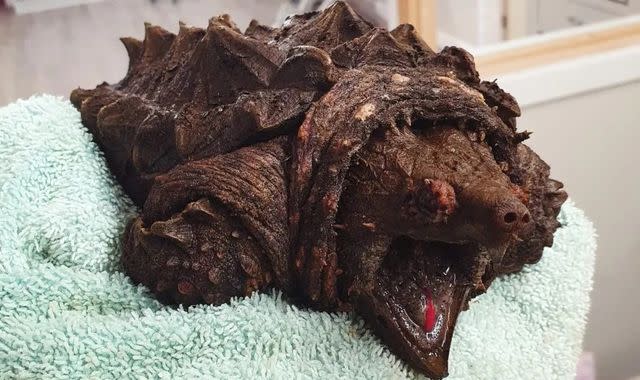'Dangerous' turtle that can bite through bone found in Cumbria

A "dangerous" turtle with a jaw strong enough to bite through bone has been found in Cumbria - and given an unexpected name by vets caring for it.
Alligator snapping turtles are native to rivers and swamps in Florida, and are recognisable thanks to their armour-like shells, which give them a pre-historic, dinosaur-like appearance.
After a number of sightings, the freshwater reptile was retrieved from beside Urswick Tarn by local parish councillor Denise Chamberlain - who put the animal in a shopping basket and took it to a vet.
Dr Dom Moule told Sky News that he was "really surprised" when Cllr Chamberlain brought the turtle in.
He thought the mysterious reptile would be a loggerhead turtle or a terrapin. "I did not expect in the slightest for it to be an alligator snapping turtle," he said.
It was probably dumped by an exotic pet owner who didn't realise how difficult it would be to look after, Dr Moule added.
More from Sky News:
The father who takes drugs in a 'cage'
Chernobyl's mutant wolves 'develop cancer resistance'
Staff at the vets are currently unable to tell what gender the turtle is as it is relatively small, but that hasn't stopped them from naming it.
"We've colloquially named them Fluffy," Dr Moule said. "In a strange way it does look quite cute, so we decided to give it a cute name."
While there's been no shortage of people offering to take Fluffy in, it's been decided that the reptile will be moved to a specialist wildlife centre in Cornwall.
Ms Chamberlain urged any exotic pet owners who feel unable to care for their animals to contact agencies such as the RSPCA and hailed the staff at Wild Side Vets in Barrow as "heroes" for dealing with the turtle.
Alligator snapping turtles are an invasive species which can "easily" bite through bone and "have been known" to sever human fingers, according to the Britannica encyclopaedia.
The turtles are hunters who typically feed on fish, frogs, small mammals and even other turtles. They can grow to 100cm long and weigh up to 90kg.

 Yahoo News
Yahoo News 
